This forum has been developed on Wurundjeri Willam land, Kulin Nation, and users accessing the forum from this continent do so from stolen lands. We enter this online space through servers hosted in the Netherlands, with its own history of colonising abroad. Online spaces have long been used as tools of digital resistance to colonisation, and we support this ongoing resistance occurring both off- and online across the world. Get in touch if you have an idea for how this forum can support First Nations resistance.
read make share
Welcome to a group for reading, making and sharing ideas.
Next session is Tues 19 Dec 6PM – DM on IG for details
How it works
This is a group that builds community around learning and sharing guided by a monthly topic. Together we choose a topic for the month, we then read/watch/listen to whatever we want on the topic, and each make something. Anything! Woodworking, songs, sketches, food, storytelling, macrame, movement, papier-mâché, film, walks, analysis. During that month we get together and share time, food and most importantly our ideas.
Whilst making is aaalways encouraged if you don’t have time to read or make anything, sitting in is welcome.
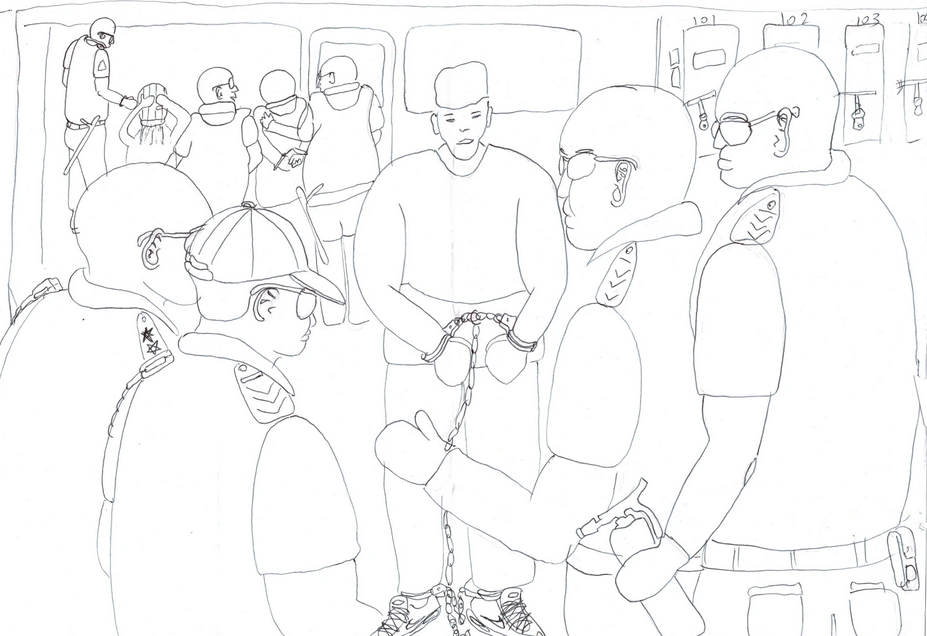
TOPIC 16: INSIDE OUT END OF YEAR TAKEOVER
NEXT MEET TUES 19 DEC 6PM
Please join us at the last RMS for the year, to make cards for people who are in prison, with Inside Out.
Inside Out does an annual card mail out at this time of year to everyone on their mailing list, and this year someone involved with the project has offered to facilitate a card making session for Read Make Share.
Come along to help make the cards or write in them, or just to have a chat about the program and prison abolition in general.
And feel free to take a look at Topic 7: Beyond Prison Abolition below if you’re looking for some resources.
About Inside Out:
Inside Out is a grassroots network of LGBTIQA+ people both inside and outside prisons across so-called Australia. We build community across the walls, amplify the voices of incarcerated queer and trans people, and provide access to information, community news and resources.
Read more here: https://insideoutaustralia.
Resources:
Inside Out: 3CR’s interview with Inside Out’s newsletter editor Miranda, talking about the project: https://on.soundcloud.com/
General prison abolition: No One is Disposable: Everyday Practices of Prison Abolition – a series of four short online videos produced by BCRW, activists Tourmaline and Dean Spade: https://bcrw.barnard.edu/
And if you’re interested in a deeper dive, we’ve reposted RMS Topic 7: Beyond Prison Abolition below
In love and solidarity,
read|make|share
DM us on IG for details, or email info at readmakeshare.space
P.S. FREE PALESTINE
🇵🇸 🇵🇸 🇵🇸 🇵🇸 🇵🇸 🇵🇸 🇵🇸 🇵🇸 🇵🇸 🇵🇸 🇵🇸 🇵🇸 🇵🇸 🇵🇸 🇵🇸 🇵🇸 🇵🇸 🇵🇸 🇵🇸 🇵🇸 🇵🇸 🇵🇸 🇵🇸 🇵🇸 🇵🇸
REVISITING TOPIC 7: BEYOND PRISON ABOLITION
We are reposting resources from Topic 7 to accompany Inside Out’s end of year card making session:
For decades now, powerful cases have been made for abolishing cops, prisons, policing – what some call the Prison Industrial Complex. These are no longer radical ideas. And we’re not here to argue that point: burn. them. down. But many of us are wondering, what comes next? How do we keep our communities safe without replicating the harmful models of the past? What does accountability look like in this future? And how do we deal with the fact that, even with the best prevention, harm persists?
Researching this topic, we quickly noticed that a lot of articles on abolition from Turtle Island (North America) don’t stack up with our experience. The situation is different here: police budgets are bigger, prisons are mostly state-owned, Australian gun laws are different and cops have a different family tree. So we’ve changed our reading list to reflect this, zeroing in on reflections from so-called Australia. The list is broken into three: an introduction to abolition and the history of police, what comes next, and additional sources from Turtle Island. Remember to just look at what interests you, the idea is to read some not all.
Finally, this topic comes with a strong content warning. Multiple sources in the reading list are flagged for discussing sexual violence, please read only what you decide is in your limits and take a break or walk away if you need to. Also, there are discussions of police violence and violence in prisons – these are also flagged.
WHAT COMES AFTER ABOLITION? READING LIST
- What is Abolition?
- Critical Resistance – What Is Abolition? (graphic, 1 page)
- Defunding the police and abolishing prisons are not radical ideas – Robyn Oxley (writing, 3 pages) [CW: police violence]
- Frontier War Stories #15, Queensland Native Mounted Police (podcast, 1hr)
- Blue Army – Paramilitary Policing in Australia (book, 304 pages) [CW: police violence]
- What Comes Next?
- Bay Area Transformative Justice – Transformative Justice & Community Accountability (graphic, 1 page)
- Black & Blue – Veronica Gorrie (interview, 51 mins & book, which we encourage buying) [CW: racism, police violence]
- What About the Rapists? Anarchist approaches to crime & justice (zine, 80 pages) [CW: sexual violence]
- Birds Eye View Podcast: A view inside from women in the Darwin Correctional Centre (podcast, 10 episodes) [CW: violence in prisons]
- The End of Policing, Reviewed by Matthew Yglesias (critical review of abolition, 10 mins)
- Additional Sources
- Angela Y Davis – Prison Reform or Abolition? (book chapter, 12 pages)
- Kamau Walton, What’s wrong with community control of policing? (vid, 8 mins)
- No One Is Disposable – Reina Gossett and Dean Spade (video series, 5 episodes)
In love and solidarity,
read|make|share
DM us on IG for details, or email info at readmakeshare.space
P.S. FREE PALESTINE

TOPIC 15: FREE PALESTINE
NEXT RMS: 28 NOVEMBER 2023 6PM
This month we will be running a sign making session for Palestine actions.
Resources:
Please see DEiFY collective’s great resource list for relevant resources, actions and news sources here: bit.ly/action-palestine-aus
Here is an excerpt from the ‘Educate yourself about Palestine’ section:
THE PALESTINE ACADEMY
“The education hub for social media Palestine awareness.” This is an interactive website that includes ‘ a free online crash course to learn about the cause and how to help spread the word.’ You can access it here.
Follow @palestine.academy on Instagram too!
DECOLONIZE PALESTINE
“[A] collection of resources for organizers and anyone who wants to learn more about Palestine.” The website includes ‘Palestine 101’, a ‘Myths Database’, information about ‘Rainbow washing’ and much more. You can access it here.
A GUIDE TO PALESTINE FOR BEGINNERS / A REFRESHER
This Google document was compiled together on Darug and Dharawal land. It is text-based and has short summaries alongside hyperlinks to further resources (in different mediums). You can access it here.
VISUALISING PALESTINE 101
Visualising Palestine 101 is a data-led visual resource and educational hub for people learning and teaching about Palestine. It includes infographics, datasets, an interactive glossary, and more. You can find their website here and their Google Doc directory here.
In love and solidarity,
read|make|share
DM us on IG for details, or email info at readmakeshare.space
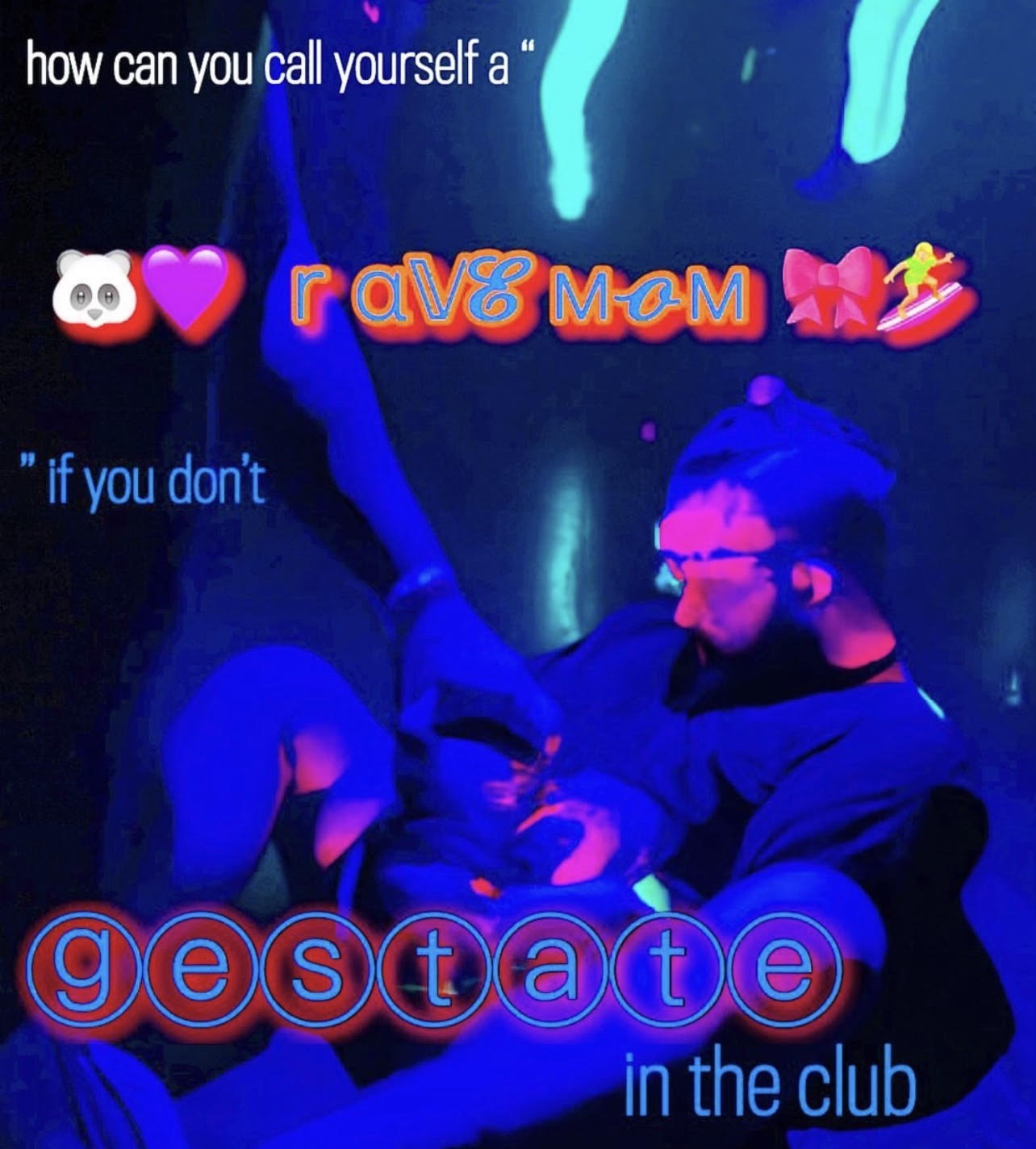
TOPIC 14: RAVING
NEXT MEET THURS 16 NOV 6PM
Dm us the location? This month, we’re all going to the rave.
The rave is where we make worlds. You don’t have to be following the recent controversy with everyone’s now-least favourite Berlin bathroom to know that raving is political. The rave isn’t only a place for pleasure—although that’s an important part of it. The rave is a place where labour happens. It’s also a place where politics happen. Ravers and those who labour (either for wage or release) in rave spaces remind us that crip bodies and crip time shape rave experiences, and that the dance industry has simultaneously been built by and consistently failed Black artists.
Raving is also a practice. For those who do it, there is an art to going to the rave, being at the rave, losing yourself, and then picking up the pieces of your scattered psyche and going home. And as McKenzie Wark will tell you, some of us need this. The constructed situation of the rave may be all some of us have — “a trans body homing in on its own estrangement, losing itself, in these alien beats”.
This month we’re getting deep into rave: as politics, as praxis, as practice, and as possibility. We’re meeting 6pm for a 7pm start.
Our reading list is below, and as usual read as much or as little as you want. Don’t forget that the important part is to make – we can’t see what you all produce.
Reading list:
- These instagram posts from SJ Norman (@vitreouslustre), and from New York and London worker-raver collectives in support of Palestine.
- This short article on raving and crip time, centred around the emergence of Crip Rave collective in Toronto.
- This two-part podcast series featuring DeForrest Brown Jr., author of Assembling a Black Counterculture and founder of Make Techno Black Again, a project that recentres the history of Techno as a Black art for surviving the end of industrialism and navigating the future.
- These articles on raving culture both locally and overseas:
- Bridget-Chappell on the spectacle-rave.
- Alexander Powers on the rise and fall of local institution Hugs&Kisses.
- hannah baer on rave and revolution.
- This chapter of McKenzie Wark’s book Raving, on ketamine femmunism.
- And finally, the period drama Beats (2019) in which two teenage Scottish boys in 1994 risk everything to attend an illegal rave.
These are a lot of resources to get through and only a week to do it. Don’t push too hard. Bring your water bottle, bring some food, and wear some shoes that are comfortable. Bring a friend. We’ll see you next week.
With love,
read|make|share
DM us on IG for details, or email info at readmakeshare.space
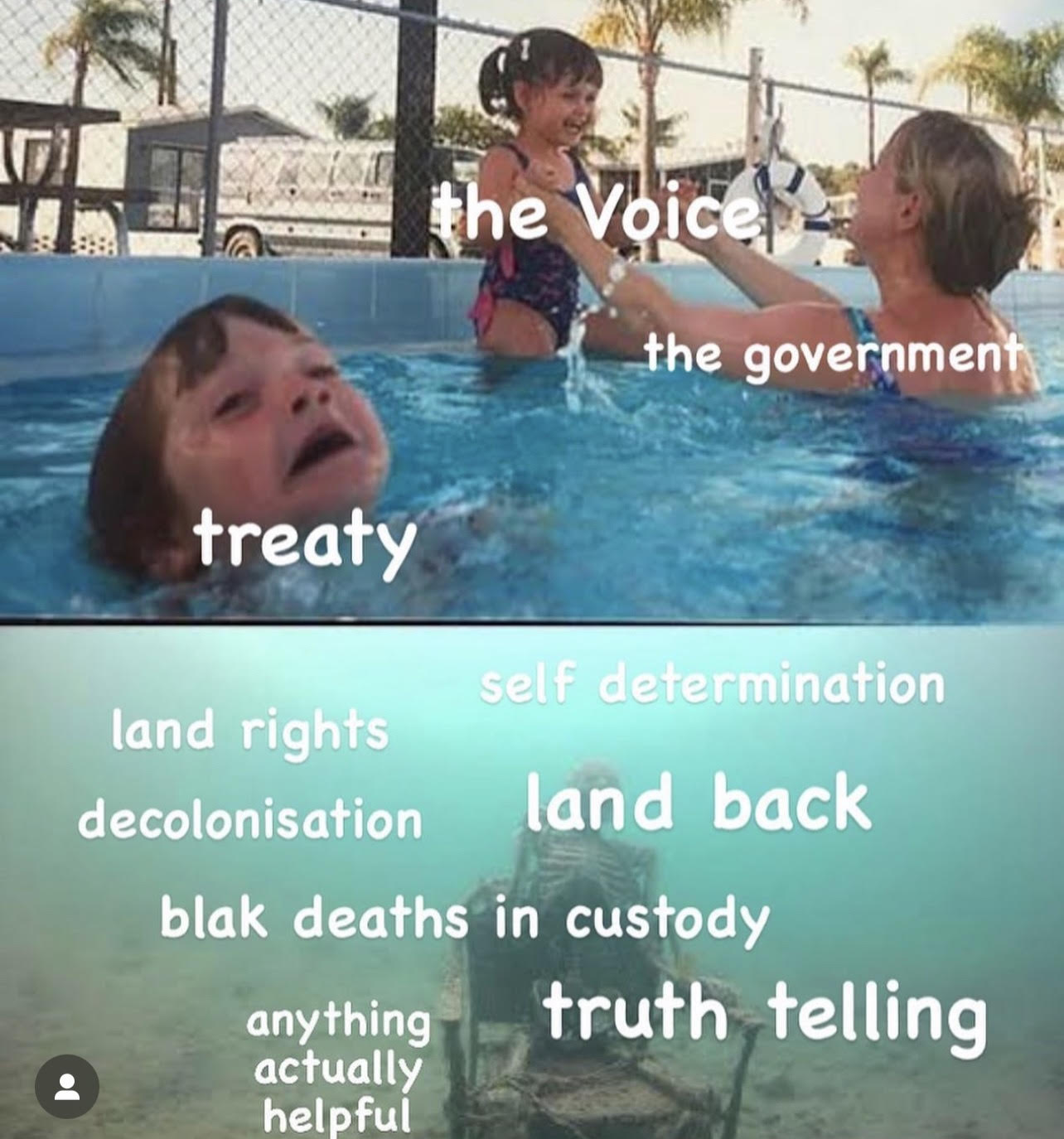
TOPIC 13: THE VOICE
NEXT MEET TUES 10 OCT 6.30PM
DM us on IG for details, or email info at readmakeshare.space
The Voice. No, not that Voice. This one.
The referendum is coming – and to understate it, there are a few different takes. One is that it could represent a step forward for the way the Australian public sees itself and its history of violent colonisation, a step on the path toward justice. In this narrative, depending who you ask, Voice might lead to Treaty and Truthtelling. It could be a step toward racial justice. Or a Yes vote might at least—its very least—be a form of harm minimisation.
There is another take, one that has been accused of being more cynical. This take argues that the Voice is more like a giant exercise in whitewashing which the Albanese government has publicly denied the Voice will lead to anything resembling treaty, land rights, or even truth telling. Advocates point out that the Voice was designed and advocated for by bureaucrats in the Howard administration, who admitted publicly that Indigenous people ‘cynical of government’ were barred from dialogues. They also point out that its backers that didn’t get consent from Anangu traditional owners to use the name Uluru in the Uluru Statement and that fossil fuel companies like Rio Tinto and Woodside are key supporters.
Meanwhile, the government has confirmed that the Voice will be ‘subservient to Parliament’ and have no guarantee of democratic representation. This has fuelled concerns that a proposed Voice body could derail the campaign for Treaty and be used to undermine Sovereign grassroots activists defending their Countries. Many staunch Aboriginal activists have warned that an ineffectual, feel-good referendum has captured the hearts of progressive non-Indigenous voters while more important issues—like land rights, prison abolition, putting an end to the Intervention, and the 339 recommendations of the Royal Commission into Black Deaths in Custody—languish in silence. These voices include Professor Gary Foley, Senator Lidia Thorpe, Dr Chelsea Watego, Aboriginal Tent Embassy co-founder Ghillar Michael Anderson, Treaty Before Voice, and the Black People’s Union.
There is a lot to unpack here. Long-time attendees will remember our discussion of Victoria’s complicated and compromised Treaty process in July last year, which left us less confused but more critical of government-led treaties. Luckily, VicSEN (your local anti-colonial Student Environment Network) have agreed to curate this month’s readings and help us navigate the mess of the Voice campaign.
We’ve put together a longer set of resources on the Voice including the Sovereign No, Critical Yes and everything in between.
As always, read some resources or all. Making something is encouraged but not obligatory—if you just want to bring yourself, that’s fine too.
RESOURCE LIST
PODCAST: Professor Gary Foley on whether a Voice to Parliament can deliver radical change.
IG POSTS: Tarneen Onus posts on voting Yes while critical and not letting the referendum divide activists.
STATEMENT AND VIDEO: The Black Peoples Union Statement on the Voice to Parliament and education class
IG POSTS: Instagram graphic series on the directors behind the Yes23 campaign.
PDF BOOKLET: The Black Sovereign Movement’s short booklet guide to the Voice.
ARTICLE: Celeste Liddle on voices and perspectives beyond Yes or No.
VIDEOS: A series of videos from Kerry Sculthorpe and Michael Mansell reflecting on the 2023 Voice Referendum and Aboriginal self-determination beyond the Voice into the future.
And some bonus resources:
ARTICLE AND VIDEO: NT elder Djiniyini Gondarra criticizing the racist No campaign for ‘misrepresenting’ his image
ARTICLE: Lynda-June Coe’s piece on why dissent is not a mandate for disrespect.
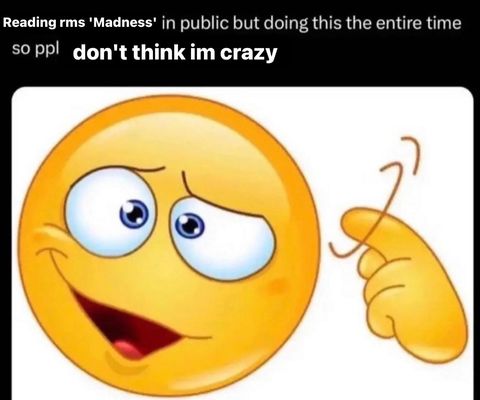
TOPIC 12: MADNESS
Madness has been represented, understood and responded to in a variety of different ways across history and cultures.
This RMS, our dive into madness specifically aims to explore and critique neoliberal Western mental health discourse and uncover alternate ways of understanding stress and distress.
The resources below draw on anti-oppressive and lived experience approaches to assist us in broadening how we see & respond to madness in ourselves & our communities.
We will be meeting at 6:30pm for a 7pm start on Tuesday 29th August in Brunswick West. Bring a plate if you’d like—and most importantly you’re invited to bring something you’ve made in response to the theme.
Sources below, read some, none, or all. It’s up to you.
Content warning: some of these resources explore heavy and potentially triggering topics such as suicide and child sexual assault.
READING LIST
Podcast (52 mins): The Failings of “Mental Health” how a seemingly benign concept might be dangerous with Bruce Cohen from Mad in America, from Rethinking Mental Health
Reading (5 pgs): The Power Threat Meaning framework summary by The British Psychological Society – the PTM is an alternative framework to the diagnostic and medical approaches to madness and mental health developed by the British Psychological Society.
Podcast (51 mins): the Hearing Voices Movement with Jacqui Dillon by Madness Radio (content warning for child sexual assault)
Chapter (15 pgs): ‘cartesian dysphoria’ from trans girl suicide museum by hannah baer, a chapter on the medicalisation of transness and how we might try to get out of it
Interview (29 mins): jonathan metzl on the protest psychosis in radio national, on the production of schizophrenia as first a disease of white housewives and later of politically active Black men
Chapter (22 pgs): thinking critically about mental illness, from Psychiatric Hegemony: A Marxist Theory of Mental Illness by Bruce Cohen
Yours in love, rage, and madness,
rms xx
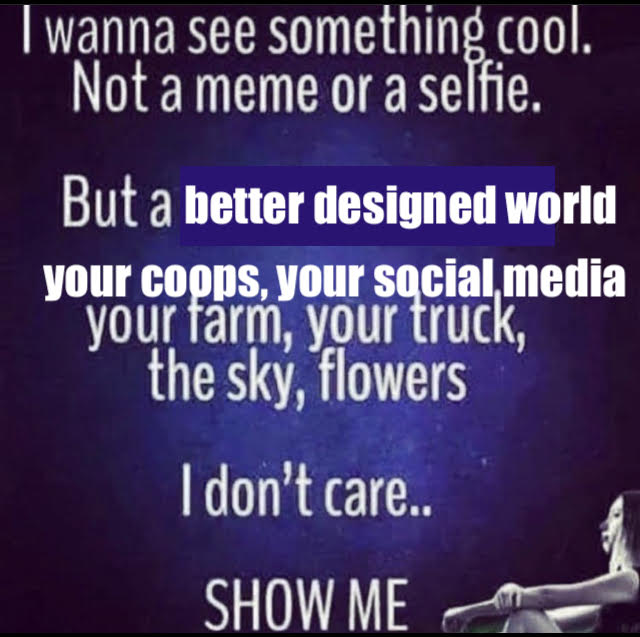
TOPIC 11: DESIGN JUSTICE
“[Design is] an ethical praxis of worldmaking” – Escobar, Designs for the Pluriverse
What does ‘design’ have to do with social justice, ecology, indigenous struggles, climate change, or spirituality? Well, critical design theory has stuff to say about the processes by which people decide how things in society should be – and that includes not just kettles, chairs and buildings but also cities, governments, corporations, apps, ideologies and narratives that together create pretty much the entire world you live in. Wait, isn’t that what we’re all kinda doing when we chat politics – deciding how we want things to be?
RMS cordially invites you to our next meetup on Tuesday, July 11th at 6:30pm in Thornbury.
Reading list below – read what you want to, what speaks to you, and don’t feel like you need to read everything. Meri has lovingly curated this list with a commentary, and if you find that useful, you’ll find a lot in there. We’re so looking forward to seeing what people make from this theme.
READING LIST
The texts I’ve picked out are all about looking at this interesting field most of us don’t have much to do with – design theory – with the goal of understanding how it can be applied in that broad and hard-to-summarise task we all share, at least in our politicised communities – roughly, ‘making the world a good place for everyone to live’.
WEB PAGE: Design Justice Network – Principles
The first one is published by the Design Justice Network, a grassroots network of design (and other) practitioners aiming to use their work to push towards liberatory futures. The ‘Design Justice Principles’ are their foundational statement on what a design process should look like when we centre that above goal – I found them really powerful.
PODCAST: Radical AI – Design Justice 101 with Sasha Costanza-Chock
This second reading is an interview with Sasha Costanza-Chock – design theorist, activist, trans woman, cofounder of the Design Justice Network and author of a book called ‘Design Justice’ – on a pretty cute nerdy podcast I like called ‘Radical AI’, which is all about the intersection of AI and tech more broadly with ethics and social justice. The podcast is a nice conversational introduction to this notion of ‘Design Justice’, and digs a bit into how critical design theory can be applied in social movements and activism relating to emerging technologies that are set to exert a lot of power over the lives of marginalised people.
Ok, so now we’ve established that design theory has useful stuff to say… it’s time to go big. Let’s redesign all of society.
BOOK CHAPTER: Arturo Escobar, Designs for the Pluriverse – Chapter 5: ‘Design for Transitions’ (attached) + audiobook of Chapter 5 + PDF of whole book
The third text, a chapter from ‘Designs for the Pluriverse’ by interdisciplinary social researcher Arturo Escobar, explores exactly that. Particularly it looks at ‘transition designs’ – that is, grand civilisation-scale transitions from our current oppressive dominator society to one that is… better. But better how? Answering that question is where design theory comes in, particularly its analysis of how design processes implicitly or explicitly rest on cultural values, norms, and even more fundamental ideas about what matters, what is real and what is possible. The risk then, in creating a grand framework for societal transition, is that we uncritically assume the centrality of a certain (likely Western, modern, anthropocentric) cultural framework and despite our best intentions, ultimately end up contributing to the erasure and destruction of indigenous, local and relational cultures. We don’t want to build a ‘one-world world’, but a ‘pluriversal’ world in which many worlds fit, to paraphrase the Zapatistas. The task taken up in this chapter is outlining, comparing and analysing the most promising frameworks arising from both the global North and global South for designing a sustainable and liveable future for human civilisation itself, in a way that preserves and enables the flourishing of that pluriverse.
It turns out that that’s a pretty hard task, so I will warn you that this chapter is not exactly a light read. It also builds a bit on previous chapters, so I wrote this little glossary:
- Ontology – philosophical questions about what is real, what exists, what is the world, what is possible. An ‘ontology’ can also refer to a particular world, or set of specific ideas about what exists
- Political ontology – whether things exist, or are possible, or not is a political question. Whether revolution is possible is in some sense ‘ontological’. Whether ancestor spirits watch over us, or whether trees and rocks and rivers have ‘lives’ that matter, whether relational networks are legible or not: these are all ontological questions that become political when other ontologies come in on tallships and start trying to ‘educate’ you. As a field of research, political ontology looks at how realities are ‘enacted’ within social and ecological networks.
- Ontological design – consider that what it means to ‘be human’ within modern society is thoroughly designed, by us and by others. Education, work and technology produce subjects whose sense of reality is conveniently aligned with the need for this capitalist society tocontinue endlessly extracting. Ontological design asks, can we re-design our ontologies to produce ourselves as subjects more capable of living relationally, ethically and acting in solidarity?
I hope that’s helpful!! If you can somehow find the time and energy to really sit with this text and give it your full attention, I think you will find it really rewarding. I specially pirated this chapter of the audiobook for you, in case that makes it easier. This book is really the main reason I wanted to curate this session of readmakeshare – it has introduced me to a galaxy of ideas and areas of research that I’ve found deeply exciting and inspiring, and over the course of reading the book two and a half times now I have found that it has thoroughly transformed the way I think about political struggles, solidarity, participatory democracy, collaboration but also modernity, ecology, living on stolen land, relationality and spirituality. I would so deeply love to share this with you.
So: we invite you to bring a plate, bring yourself, and make something to share. We would love to see you there to help us design a better world.
Yours in justice and solidarity,
rms xx
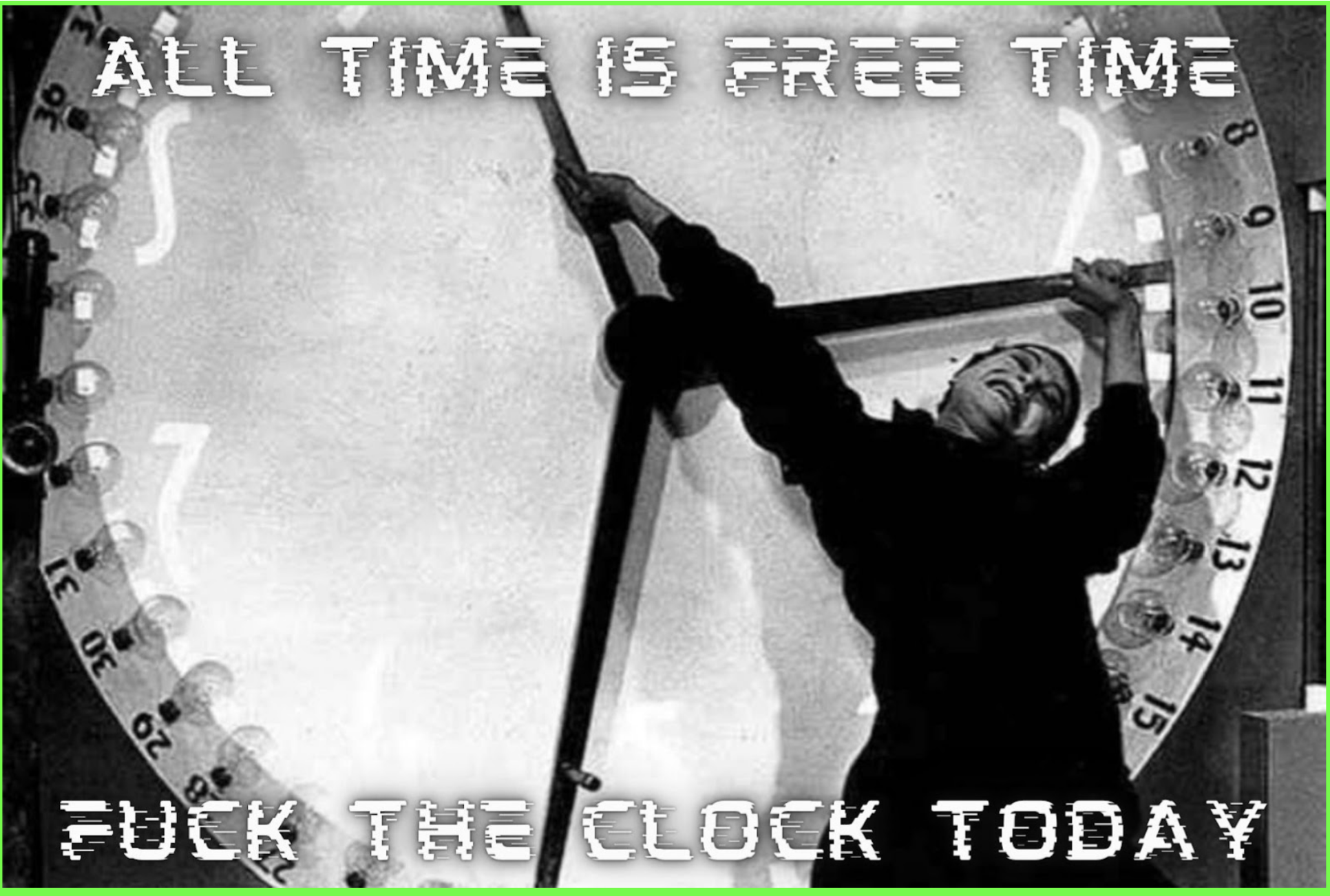
TOPIC 10: FUCK THE CLOCK
Time and temporality | Capitalism | Embodied liberation
Have you ever felt like you can’t keep up with the clock, that everything ticks too fast? No matter how busy our lives are, there is insidious pressure to always be somehow doing more. These capitalist schedules which measure our labour and lives have become naturalised, and even those who reject capitalism often push themselves towards maximum efficiency and struggle to rest.
When we investigate the history of clock-time, we find it is not a ‘natural’ thing. Instead, it has been strategically imposed in the last ~300 years. Clock-time rose with colonial capitalism, imposed onto the working class, slaves and Indigenous peoples across the globe. In the present day it renders us anxious, chronically busy and geared toward self-discipline at the cost of individual and societal wellbeing. In the mainstream, ‘productive’ people are celebrated while people labelled ‘unproductive’ (like parents, artists, chronically ill and disabled people) are shamed. We live in a temporality that is fundamentally at odds with the time of our bodies, care and the non-human world.
But there are other ways to know time. What temporalities exist outside capitalism? How can we embody and support divergence from oppressive social standards and business as usual? What are the temporalities of geological time or of the climate? How can we better demarcate our lives? When have you felt timeless, infinite, cyclical? What does liberation from clock-time feel like in your body? In short, we ask you to reimagine time, and reclaim the past-present-future for collective liberation.
After a roaringly successful reunion to Abolish the Family, read make share is back for another round. With thanks to Fran, this June we turn our abolitionist gaze to time itself, asking what a world where we fucked the clock could look like.
We’ll be meeting at 6pm on Thursday 1st June, DM for address. Bring a plate or drinks to share, and bring a make if you made one.
Core reading list:
- Time – Ambelin Kwaymullina [poem] – This poem shows us how colonial time has been weaponized against Indigenous peoples, and presents an Indigenous conception of time that implies responsibility to each other and the non-human world.
-
Saving Time: Discovering A Life Beyond the Clock – The Long Now [podcast] – This is a podcast where Jenny Odell discusses and reads from her book of the same title (which is amazing if you want to go deeper). The topics range from time-discipline in Amazon factories, to the long temporalities of geological time, to finding agency in the face of the climate emergency.
-
Time, Work and Industrial Capitalism [article] – This incredible article from 1967 details the emergence of clocks and time-discipline in a rapidly industrialising United Kingdom. It’s wordy and long but a real pleasure.
-
Rest is anything that connects your mind and body – Tricia Hersey [blog post] – In this short blog post, Black feminist and activist Tricia Hersey lays out her mantras and motivations for her movement ‘Rest Is Resistance’.
Bonus materials:
- Bayo Akomolafe on Slowing Down in Urgent Times – For The Wild podcast – In this podcast, Bayo urges activists to reconsider strategies of resistance that reproduce capitalist temporalities, and to embrace the strange and unwieldy callings of the anthropocene.
- Mother’s Tongue – Jared Field [poem] – Jared Field explores place-time as it is impacted by mining on Country. This poem is brilliant.
- Timekeeping on Country – Cass Lynch [seminar] – In this lecture, Cass Lynch details the way she taps into the long and care-full temporalities of spiders on Noongar Country.
- How Does Time Flow in Living Systems? Retrocausal Scaffolding and E-series Time – Nomura et al [article] – This is a scientific and technical deep dive into how ‘living organisms keep time based on the local activities of each participant and form ecological clocks together’.
- Abolish time – Frances Renaissance & friends [collaborative are.na channel] – This are.na channel is Fran’s collaborative collection of Fuck The Clock related media going back 4 years. If you don’t have Are.na you can still peruse, and if you do have Are.na feel free to add to it!
Of course, don’t forget that making something in response to the theme is just as important as the reading. Anything goes – poem, food, sketch, social club, beanie kid. If you don’t get a chance to make anything, that’s fine. If you do, we can’t wait to see it. Looking forward to seeing everyone on Thursday 1st June 
Timeless love,
rms xx
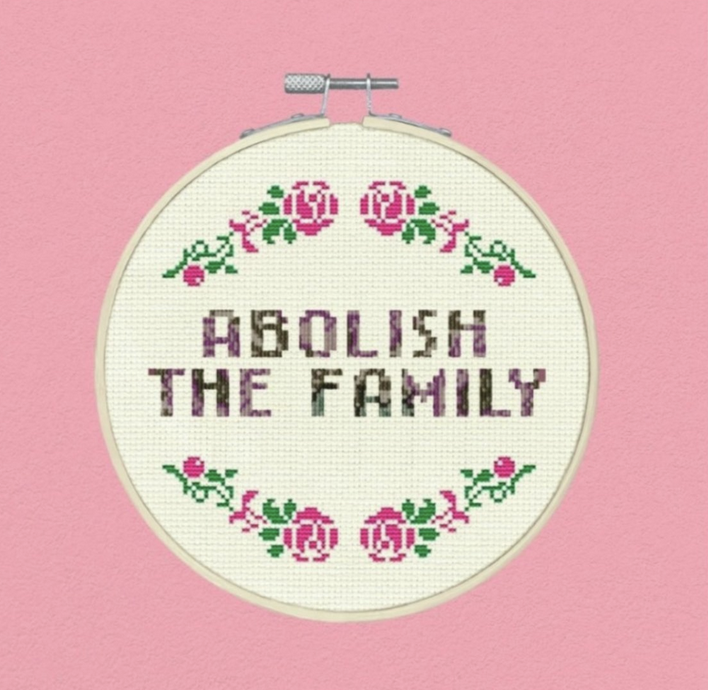
TOPIC 9: ABOLISH THE FAMILY
Care bottoming | Chosen family | Welfare
“Abolish the family? You might as well abolish gravity,” begins Abolish the Family: A Manifesto for Care and Liberation, the new book from Sophie Lewis.
But we need to talk about family. The cost of living for single households continues to rise. Young people without wealthy families or six figure jobs are almost entirely locked out of secure housing. Queer and trans youth continue to be at risk of harm from unsupportive families and increasingly hostile schools. Fascists march in our streets and libraries under the banner of ‘protecting children’. Welfare and housing policies continue to reinforce the dominance of families at the expense of wages and social services. Homonormativity is lurking around the corner as queers shack up, get a house and kids, and imitate Scott and Charlene from Neighbours. Communes are mostly museum pieces. And sixty years on from the second wave of feminism, women and caregivers are still working the ‘double shift’ of waged labour and housework.
This month, to welcome back the read make share community, we’re taking a deep dive into the past and present of radical movements to imagine family abolition. In other words, we are turning away from the privatization of care toward a future in which love, care, and belonging are a communal effort.
We’ll be meeting at 6pm on Wednesday 10th May at Willow’s place. Bring food, drink, dessert and snacks if ya can, we’ll have some dinner too.
Family abolition is a world-making act – an act of addition rather than subtraction. We want to ask, what conditions would make a world possible where families (as we know them) are no longer needed? Or, in the words of Audre Lorde:
‘I think that some of the taboos that we suffer under now, that a family must be made up of male/female plus children, all locked into a kind of an authoritarian, blind, give or take, I think that that will hopefully disintegrate. I think that if we begin to think of families in a wider context, groups of people relating to each other in a give-and-take manner, then our definitions of families will broaden so that we have groups of people, sustain groups, support groups, in whatever period of life, whatever time, what ever place, right, that come together and remain.’ ~ Conversations with Audre Lorde
Reading list
This month’s reading list is short and sweet. If you only have time for one thing, choose Lola Olufemi’s interview with Sophie Lewis on abolishing the family. The rest are outstanding too.
- I Dream of Canteens – a short 5-minute read by food writer Rebecca May Johnson that, at first glance, has nothing to say about family abolition but everything to say about care.
- Sophie Lewis and Lola Olufemi on abolishing the family in a one-hour podcast with London Review of Books. Sophie Lewis, author of Abolish the Family, traces the long history of family abolition from nineteenth century utopian socialists to anti-family radical feminists and gay liberationists, and finally to today’s Black feminists and queer marxists talking family abolition.
- Bhenji Ra on embodying future forms of family at home and away in New York’s ballroom community, as part of an interview for Assemble Papers’ edition on Radical Family.
- Melinda Cooper in this short panel discussion on family, housing and welfare in post-1970s Australia. Why did so many 60’s radicals give up on the idea of non-heteronormative communal living? Why does JobSeeker suck? And why is rent in Sydney so damn high? The answers are more closely linked than you might think.
Of course, don’t forget that the making is just as important as the reading. If you don’t get chance to make anything, that’s fine. If you do, we can’t wait to see it. Looking forward to seeing everyone on Wednesday 10th May 
Happy reading,
rms xx
Supplementary reading
- The long history of family abolition in Sophie Lewis’ Abolish the Family. In this urgent, incisive polemic, feminist critic Sophie Lewis makes the case for family abolition and insists: only by thinking beyond the family can we begin to imagine what might come after.
- Queer family in Octavia Butler’s Patternist series and Xenogenesis trilogy, both of which explore issues of race, sexuality, and family-building through SF stories of resistance.
- Interspecies, non-bio, non-family relationships in Samuel L. Delany’s queer New Wave sci-fi epic Stars in My Pocket Like Grains of Sand. In this hyper-connected world, generations are ripples, communities are streams, and gender as we know it is an antiquated poetic device.
- Carol B. Stack’s All Our Kin: Strategies for Survival in a Black Community, a book that debunked the misconception that poor families were unstable and disorganized. Instead, this shows the highly organized kinship networks in Black communities that pool their resources in order to best weather poverty’s ill effects in America.
- The Care Manifesto, expanding concepts of care, changing power dynamics of care, and alternate models of care outside the family. The Care Manifesto taps into the conditions for making family abolition possible, and offers a glimpse of a much more caring future.
- Hortense Spillers’ 1987 essay Mama’s Baby, Papa’s Maybe: An American Grammar Book, on African American gender construction, has become famous for contesting the stereotype of the absent black father and championing the legacy of Black, matriarchal, and community-wide ways of doing (and undoing) family. A must-read of family abolition literature.
- Similarly, Cathy Cohen’s essay Punks, Bulldaggers, and Welfare Queens digs into the radical potential of queer politics for a transformational politics built on coalitions. Cohen wants us to recognise the link between the ideological, social, political and economic marginalization of queer ways of living and caring for each other. Another classic read in family abolition lit.
- Finally, see Kai Cheng Thom’s I Hope We Choose Love, and especially the chapter ‘The Ties That Bind, the Family You Find, Or: Why I Hate Babies’ where Thom reflects on feelings when friends have children, and the role of queer adults without kids of their own.
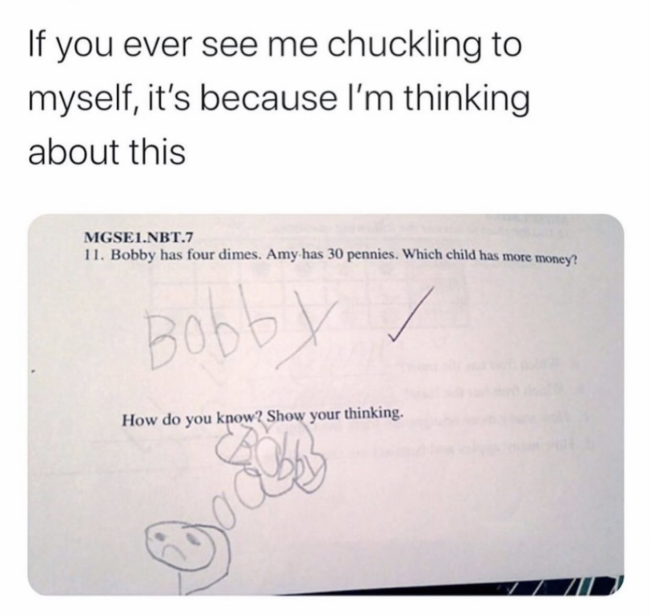
TOPIC 8: RADICAL PEDOGOGY
Liberation | Community | Reciprocity | Hierarchy Distruption
“Education at its best – this profound human transaction called teaching and learning – is not just about getting information or getting a job.
Education is healing and wholeness. It is about empowerment, liberation, transcendence, about renewing the vitality of life. It is about finding and claiming ourselves and our place in the world” – Parker Palmer
This month, we’re looking at Radical Pedagogy. In other words, we’re re-imagining what education and learning can look like – in the classroom, in community, in our lives. We’re investigating the disruption of student-teacher relationships, and thinking about models of learning that can transform society.
We’ve had a very special guest resource curator for this topic, Miss Eve (teacher, student, teacher-student, student-teacher), who has prepared a delectable list for us, and this reflection to guide us.
I’m an educator. I love what I do in the classroom. But I’m disheartened and frustrated when I hear too many colleagues trying to “stomp” on children in the classroom and “squish” out what makes them human. Whilst considering the readings for this topic, I came across an old speech to Parliament that sheds light on the origins of Victoria’s education system. James Miram, a powerful businessman and politician, demanded that the colony make children “working bees in the hive, instead of allowing them to become useless drones”.
It can be easy to fall into despair when you’re faced with these realities and history. But we need to remember bell hooks’ advice that “despair is the greatest threat. When despair prevails we cannot create life-sustaining communities of resistance. Paulo Freire reminds us that “without a vision for tomorrow, hope is impossible.””
The resources for this topic help us to remember, going back to bell hooks, that “progressive education, education as the practice of freedom, enables us to confront feelings of loss and restore our sense of connection. It teaches us how to create community.” I see that community being created in r|m|s.
We highly recommend engaging with the core four resources. Then pick out some resources from the extras that speak to you.
Here is your October Read Make Share spicy hot list of absolute bangers:
Core Readings
- bell hooks – Engaged Pedagogy (chapter from Teaching to Transgress) – a short chapter from bell hooks on educating as a practice of freedom. Read read read.
- Society Lets Children Down (podcast) – the Srsly Wrong podcasters imagine a directly democratic agetopia, where differences in age are part of a complimentary whole.
- Are We Ready for School Abolition? (article) – well, are we? This short article reflects on what radical educators can learn from abolitionists about educating without schools.
- Tyson Yunkaporta – Lines in the Sand (chapter from Sand Talk) – a chapter from Tyson Yunkaporta’s book which discusses pattern thinking and different learning systems.
Supplementary Readings
- Shimmering: Animating Multispecies Relations with Wurundjeri Country (article) – two early childhood educators reflect on how colonisation separates humans from nature and how we can build multispecies learning relationships with Wurundjeri Country.
- Feminist in Cell Block Y (video) – one example of radical education spaces and ideas of radical pedagogy in practice, in a US prison.
- bell hooks – Teaching with Love (chapter from Teaching Community) – another great chapter from bell hooks about emotional connections between teachers and students.
- Red Menace – Pedagogy of the Oppressed (podcast) – a detailed book summary but the dicussion and the language is heavy and kinda overintellectual in analysing Paolo Freire’s book
- Emergent Strategy (visual) – visual (shown below) summarising the ideas behind adrienne maree brown’s breathtaking teachings on activist strategy.

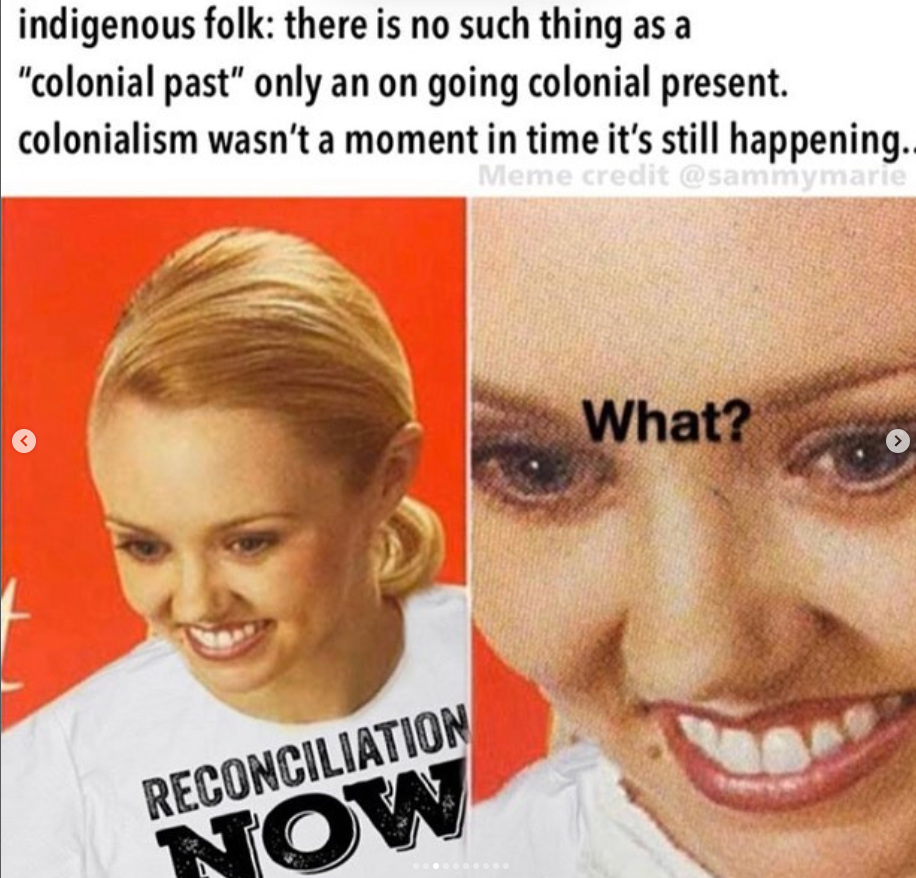
TOPIC 6: ALWAYS WAS, ALWAYS WILL BE
Blak Sovereignty | Blak Rights | Blak Power
Change often looks like a miracle in retrospect. We focus attention on a pivotal moment that set momentum for change on an unstoppable path, or we valorise a person as pivotal to change and focus on them. Driving past Aboriginal Community Health Organisations, where grand murals tell epic stories, we can remind ourselves that change happens from the work of many over years.
Our next topic is about the past, present and possible futures of Blak Sovereignty. Societies 60,000 + years old are fighting for custody of land and children that they’ve been guardian to over generations. We are on the precipice of another Mabo moment, something that might define future understanding of Blak Sovereignty. A referendum. There is a lot of work that has lead to this moment that we should understand. On top of that, does Albo’s Labor Gov being “committed” to the Uluru Statement of the Heart help or hinder First Nations Sovereignty? What does it mean that BHP and Rio Tinto support the Uluru Statement? If settlers outnumber First Nations people what do settlers need to know about Voice, Treaty, Truth? Especially when there is a risk of silencing First Nations’ voices.
We know that the first step to understanding is listening, so this month we want to prioritise reading. For this list, it’s strongly advised to get through as much as you can. We also suggest the makes be, at least at first, the act of diving into the tide of opinions and floating in the feelings. This list is our attempt at collecting a range of Blak voices speaking in the Voice, Treaty, Truth narrative. Some are less recent than others and are included because they hold ideas that are powerful, but as readers we should be careful not to reduce people to an idea that may have since changed.
In the list below we’ve tried to avoid normative language that might create any bias before looking. Look forward to sharing!
Background
This is an Uluru Statement from the Heart explainer from professor Megan Davis. She’s been active and deeply engaged in the development of Constitutional Recognition and reform for Aboriginal self determination for many years before the Uluṟu Statement. This video presents that work in the context of the Uluṟu Statement and is a convincing presentation (5 min VIDEO)
https://www.youtube.com/watch?v=-dsCJGdY9Lc
This is a video of the delegates who walked out from the Convention for Constitutional Recognition that created the Uluru Statement. It’s the top of the iceberg and posted along side this is the written, outlined issues the Walkout Collective have (10 min VIDEO and 20 min WRITING)
http://nationalunitygovernment.org/pdf/2017/Aboriginal-Embassy-Statement-from-the-Sacred-Fire-2017.pdf
All the hot takes
Stan Grant is talking to a constitutional reform expert in this edition of the Religion and Ethics report on RN. It is another positive and supportive take on Uluru Statement but also has some context that is divisive around consensus and forgiveness (10 min AUDIO)
Nayuka Gorrie in this article speaks to the difficult politics of what is the ‘right’ way forward in this moment of pivotal change and empowerment (15 min WRITING)
https://www.vice.com/en/article/qb5zdp/fuck-your-recognition
The late Wiradjuri elder Les Coe speaks about the walkout at the talks on constitutional recognition. He voices his concerns that he doesn’t want to sell out his people (10 min AUDIO)
https://www.3cr.org.au/sites/default/files/audio/Les Coe_Black Block 19 10 2020.mp3
And finally this Megan Davis article in Mamamia reiterates some of the ideals that the Referendum Council wish to achieve through their reformations (10 min WRITING).
https://www.mamamia.com.au/what-is-the-uluru-statement-from-the-heart/
Deeper deep context
This panel discussion brings together Aboriginal community members Lidia Thorpe, Paola Balla, and Crystal McKinnon to discuss the treaty process and Aboriginal sovereignty. It’s a critical look at the Victorian Treaty process with some lessons for the discussion around the Uluru Statement (30 min AUDIO)
https://www.3cr.org.au/accentofwomen/episode-201904300830/sovereignty-treaty-and-constitutional-recognition
These three locations on social media offer an insight to the negative fall out around the Uluru Statement from the Heart –
The Facebook page Abolish the Statement from the Heart https://www.facebook.com/abolishthestatement/
Twitter thread by Latoya Rule https://twitter.com/latoya_aroha/status/1533226332212981761
Instagram story by @gudhigudhi (Ruby Wharton) and Vika Mana https://www.instagram.com/s/aGlnaGxpZ2h0OjE3OTIyMTQ4NTUwMzU1ODg4?story_media_id=2537670255726908357&igshid=YmMyMTA2M2Y=
And for those that want to look more broadly at the work of fighting the colonial settler project and protecting Aboriginal and Torres Strait Islander Country and Culture (potentially more on this in a future month) check out:
This First Australians documentary series is an excellent deep dive and is worth revisiting if you’ve seen it before. Poignant reminders of the depth and breadth of Indigenous cultures and the impact of colonialism. We recommend Episode 3 ‘Freedom for Our Lifetime’ about Coranderrk mission and the Wurundjeri resistance. Check it out on SBS (VIDEO): https://www.sbs.com.au/ondemand/program/first-australians
Ningla A Na (1972) documentary recording the events surrounding the establishment of the Aboriginal Tent Embassy (VIDEO): https://www.kanopy.com/en/product/66822
Gary Foley and Andrew Schaap’s book on The Aboriginal Tent Embassy: Sovereignty, Black Power, Land Rights and the State (WRITING): https://drive.google.com/drive/folders/1nzoENPC3C0ffyGdygo-ABulHDE6vJiwJ?usp=sharing
TOPIC 5: HACK THE PLANET
Surveillance Capitalism 💻 Data Feudalism 💻 Luddism 💻 Techno Sovereignty
This time our reading list is less curated, you will notice a full length film, 2 books, a podcast, an article, an animation from an online exhibition, and a video game.
We are trialling a more choose-your-own-adventure model, where we haven’t specified any particular sections of resources and you are welcome to choose any part of these, or choose something outside of this list. If you go with a book, we’d recommend starting with the intro or choosing an interesting chapter. From there it’s up to you.
Remember, as always, the most important part is to make, so don’t get stuck in the muck.
Our next meet will be at 6pm on Tuesday 7th June, usual place. Details sent closer to date.
Film:
Cult classic internet culture hit that catapulted hacking into the public consciousness. Made in the mid-1990s when the Internet was unfamiliar to the general public, it reflects the ideals laid out in the Hacker Manifesto (not McKenzie Wark’s) quoted in the film: “This is our world now… the world of the electron and the switch […]Don’t come for accurate representations of hacking, but stay for 90s drip and reflections on the ethics of being a hacker. Download here.
Books:
A Hacker Manifesto – McKenzie Wark, is a critical manifesto written by trans critic McKenzie Wark, which criticizes the commodification of information in the age of digital culture and globalization. A new tech age satirical spin on the Communist Manifesto, it was published in the United States in 2004.
The first section ‘Abstraction’ is fairly short. If you have time, we recommend reading it in full.
New Dark Age – James Bridle: We live in times of increasing inscrutability. Our news feeds are filled with unverified, unverifiable speculation, much of it automatically generated by anonymous software. As a result, we no longer understand what is happening around us. Underlying all of these trends is a single idea: the belief that quantitative data can provide a coherent model of the world, and the efficacy of computable information to provide us with ways of acting within it. Yet the sheer volume of information available to us today reveals less than we hope. Rather, it heralds a new Dark Age: a world of ever-increasing incomprehension.
We recommend starting with ‘Chasm’ as an introduction. ‘Concurrency’ is also a chapter one of us really liked.
Podcast:
**This Machine Kills – Episode 28: The Hammer of Ludd:** At last, the Luddism episode has dropped! We dig into the actual, and massively misunderstood, history of Luddites — not as an insult for people who are deemed “anti-progress,” but as a labor movement who confronted the machinery of industrial capitalism. We discuss how Luddism should inform militant working class power, what lessons we can apply today for how we think about technology, and draw connections to other struggles against oppressive systems, whether in the streets or the shop floors. Think of Luddism as like Marie Kondo, but for technopolitics. Does this technology contribute to human well-being and/or social welfare? If not, take it apart and toss it away!
Article:
**How to destroy surveillance capitalism – Cory Doctorow:** Surveillance capitalism is everywhere. But it’s not the result of some wrong turn or a rogue abuse of corporate power — it’s the system working as intended. This is how to destroy surveillance capitalism.
Animation:
New extractivism – Vladan Joler: “A new form of extractivism defines life in the 21st Century. It is one that reaches into the furthest corners of the biosphere and the deepest layers of human cognitive and affective being: the stack that underpins contemporary technological systems goes well beyond the multi-layered ‘technical stack’ of data modeling, hardware, servers, and networks. Today’s full stack reaches into capital, labor, and nature, while demanding an enormous amount from each.”
Videogame
**Unmanned:** In this game by activists and videogame thinkers Molleindustria explore how technology rewires our relationship with war, and what roles people can take from the safety of their hometowns. “Take the role of soldier: one who remotely drops bombs on foreign soil during the day, and at night goes home to his family in the suburbs. In Unmanned, the conflict is internal — the only blood you’ll shed is from shaving cuts. But is there collateral damage in this new way of waging war?” Some VPN don’t allow flash so you might have to fiddle with your settings to make it work.
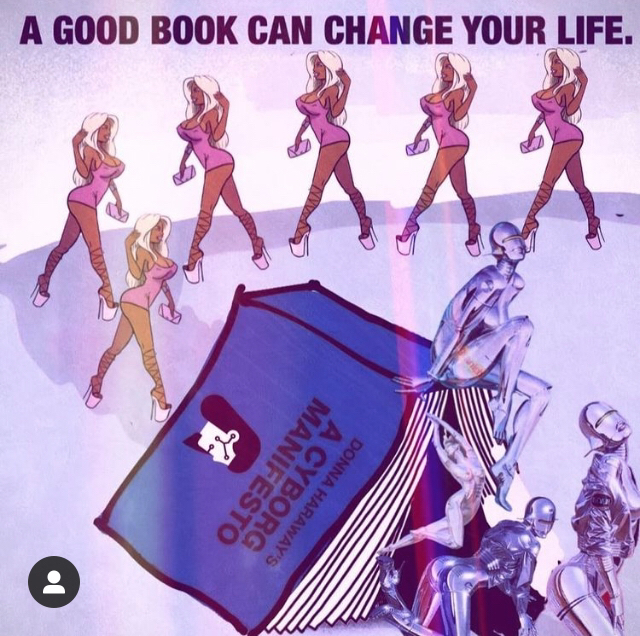
Topic 4: Future Feminisms
✨ Eco-feminism ✨ Black feminism ✨ Cyborg feminism ✨ Xeno feminism ✨ Trans feminism ✨
’By the late twentieth century, our time, a mythic time, we are all chimeras, theorized and fabricated hybrids of machine and organism; in short, we are cyborgs.’ Donna Haraway, The Cyborg Manifesto
Feminisms will remain ‘possible futures’ while we continue to organise our society as a patriarchy. Although some feminist ideas have been incorporated into the now-dominant wokeness, these ideas leave capitalism and colonialism intact, and leave many women behind.
This month we’re going full cyborg. We’re taking a look at feminisms – some with a long history – which glint on the horizon of possible futures. How do we build a feminist future that is faithful to socialism, anti-colonialism, Indigenous sovereignty, Black liberation, and gender abolition: a feminist future for all women?
But what even is a woman? Often ‘woman’ is a stand-in for a very particular, historically situated class of white women. As Aileen Moreton-Robinson points out in Talkin’ Up to the White Woman:
‘To represent middle-class white women as all women was a political act, because it meant that shared oppression could be the basis for political mobilisation… the invisibility of white race privilege and class oppression is an outcome of giving primacy to gender oppression and sex difference.’ Aileen Moreton-Robinson, Talkin’ Up to the White Woman
Or take Haraway’s explanation which echoes the same ideas:
’There is not even such a state as ‘being’ female, itself a highly complex category constructed in contested sexual scientific discourses and other social practices. Gender, race, or class-consciousness is an achievement forced on us by the terrible historical experience of the contradictory social realities of patriarchy, colonialism, and capitalism.’ The Cyborg Manifesto
After a month off, we’ve put together a reading list as deep and wide as this subject deserves. A glance through the list below reveals Audre Lorde’s 1985 future-focused keynote address and Kai Cheng Thom’s meditations on trans futures and the disruptions of premature death. Other sources include Helen Hester on Xenofeminism, director and performer Vex Ashley’s reflections on being a cyborg cam-girl, and multidisciplinary artist GLOR1A exploring the concept of a global nation-state for black people. If you want to go deeper, Octavia Butler, Aileen Moreton-Robinson and Donna Haraway’s original cyborg text are all here too.
We recommend reading some, not all.
Don’t forget the most important part is to make and share. See you at our next meeting on Monday 2nd May at Cole Crescent, Coburg. More details to come.
FUTURE FEMINISMS READING LIST
Getting started:
-
Read Audre Lorde’s Keynote Address from the 1985 Melbourne Women’s Writers’ Festival
-
Read an extract from Xenofeminism by Helen Hester, exploring how using and repurposing technology can contribute to feminist liberation
https://drive.google.com/file/d/1-uOmlUwGgFL-cny0ofGZRQ6iNi9puiqK/view
-
Read Kai Cheng Thom’s essay: ‘Dear, dear life’ from I Hope We Choose Love: A Trans Girl’s Notes from the End of the World
https://drive.google.com/file/d/1A8qtWQPP0dAhaixCXAzLUM9AuaUTXBH5/view?usp=sharing
-
Watch Vex Ashley’s A Cyborg Manifesto: a personal meditation on female identity, commodification, cyborg existence and camming [NSFW]
-
Watch Dark Matter Inc: a fantastical essay and performance written by multidisciplinary music artist GLOR1A
Deeper dive:
-
Read the Octavia Butler short story The Book of Martha
https://drive.google.com/file/d/15caxjDP5rfOhYZixp9VHqy2ifNFRfQcm/view?usp=sharing
-
Watch Catherine Rottenberg’s summary of the Care Manifesto
-
Listen to this interview with Sophie Lewis on surrogacy, cyborgs and feminism against family
https://www.e-flux.com/podcasts/407856/sophie-lewis-on-full-surrogacy-now
-
Read Aileen Moreton-Robinson on reviews of her book Talkin’ Up to the White Woman
https://drive.google.com/file/d/1S0hQXJLjetB9sBGDQF7B7Lfjo8_jhLHA/view?usp=sharing
-
Read Feminism for the 99%: A Manifesto
-
Read Donna Haraway’s touchstone essay A Cyborg Manifesto
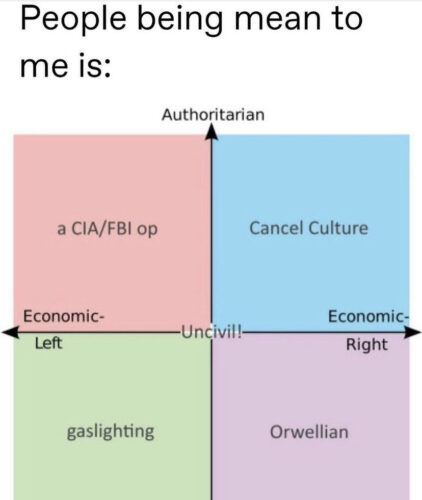
Topic 3: Freakin’ Cancelled
What are we doing when we talk shit about cancel culture? Are we doing it for clout, or is there a more important reason to move away from this style of community building? When critiquing a cultural movement, identifying the problems is often easy – the harder part is imagining what comes next.
Last time, we touched on the relationship between identity politics and neoliberalism. This time, we expand on that topic, focusing on cancel culture and alternative models of transformative social movements.
After an extended holiday break, we have a list choc-full of readings for you to pick from. We recommend reading some, not all. Mark Fisher’s classic piece Exiting the Vampire Castle opens up the conversation. Non-hierarchical organiser Adrienne Maree Brown gives a rundown on cancellation vs abolition and Sarah Schulman talks about conflict. In Fucking Cancelled, Clementine Morrigan and Jay Lesoleil talk about ‘the Nexus’, a synthesis of identitarianism, social media, and cancel culture, and propose an alternative based on their experience. Meanwhile liberals, conservatives, shock jocks and more offer their views on cancellation in Cynical Theories, Shut Up, and On The Media.
Don’t forget the most important part is to make and share. See you at our next meeting on Monday 7th March. More details to come.
If you’d like to talk about cancel culture and its alternatives, you can do that on this month’s forum thread: https://readmakeshare.space/forum/viewtopic.php?f=10&t=16
MARCH: Freakin’ Cancelled
Getting started:
- Read Mark Fisher, Exiting the Vampire Castle https://www.opendemocracy.net/en/opendemocracyuk/exiting-vampire-castle/
- Read adrienne maree brown, We Will Not Cancel Us: Read some of the book, or listen to this interview with Adrienne Maree Brown on Cancellation, Abolition, and Healing (transcript available) https://thefinalstrawradio.noblogs.org/post/2021/02/14/adrienne-maree-brown-on-cancellation-abolition-and-healing/
- Listen to the Ezra Klein Show – Sarah Schulman’s radical approach to conflict, communication, and change https://www.nytimes.com/2021/06/22/opinion/ezra-klein-podcast-sarah-schulman.html
Deeper dive:
- Listen to Fucking Cancelled, a leftist podcast on ‘the nexus’ (a synthesis of identitarianism, social media, and cancel culture) and proposal for a different vision of justice grounded in solidarity, freedom, and responsibility. People are likely to have different opinions on this source. Start with the first 40 mins of Ep #1, then if you’re interested listen to the most recent episodes: https://fuckingcancelled.libsyn.com/
- Read the introduction to Cynical Theories, a more classical liberal take on cultures of activism in academia, which argues that ‘postmodern theory’ contributes to cancel culture and leaves liberal democracy in crisis. Link here: https://tinyurl.com/cynical-theories
- Listen to ‘Shut Up’ Ep #5 by Sami Shah, the final episode which includes some interesting takes on what we get cancelled for and what society is trying to achieve. Different Oz public figures provide their diverse opinions, with even infamous shock-jock Andrew Bolt taking a stand: https://www.abc.net.au/radionational/programs/earshot/not-shutting-up/10986014
- For a different view on the cancel culture scare, Listen to On the Media, There is No ‘Cancel Culture’. Cancellation happens differently in right-wing and left-wing political communities, and the cancelled people database discussed on the show is a helpful example of this. Listeners might find links between Andrew Bolt’s conservative take and right-wing reactions to being ‘cancelled’ (hated by the left). Full episode here: https://www.wnycstudios.org/podcasts/otm/segments/there-no-cancel-culture-on-the-media
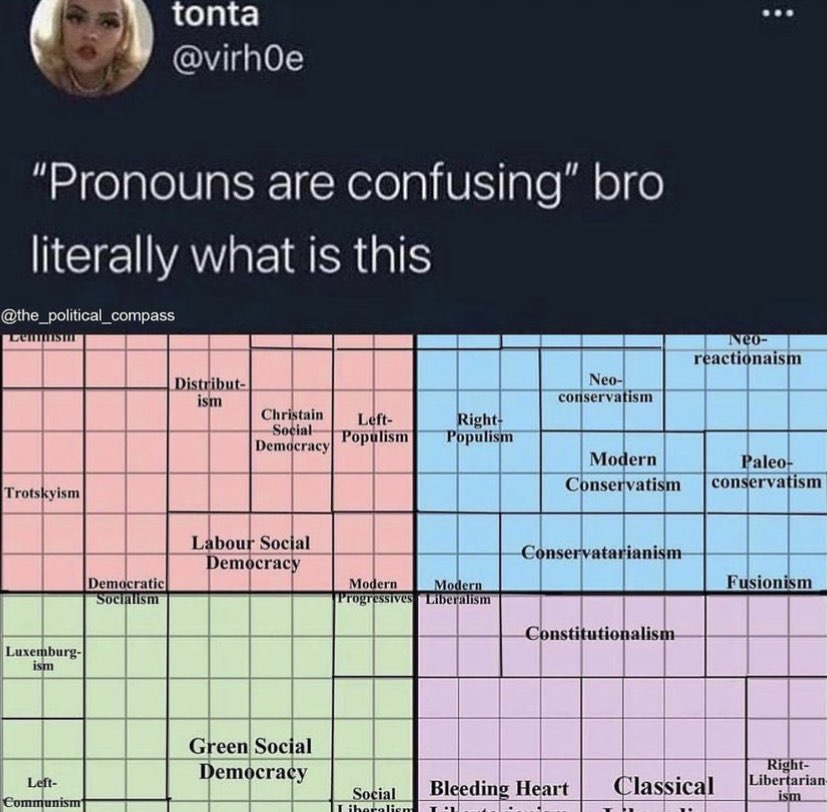
Topic 2: sHut Up IdPoL
Anti- identity politics critiques are central to modern right wing and centre-right discourse, and Scomo has spoken out against idpol this year for the first time.
But what if they’re (kind of) right? Anti-idpol sentiments are increasing on the left, and now is time to decide how to move forward, past a neoliberal identity politics which would see an equal distribution of disadvantage, to a model of genuine solidarity which removes disadvantage equitably.
This month, we have just 3 resources focussing on identity politics. We encourage you to take a look at at least one, and make something which reflects your experience of, understanding of, or hopes for identity politics.
Next month, we will be continuing this topic, focussing on cancel culture and alternative models of transformative social movements. We’ve included a preview of resources from this month too in case you want to get started early.
If you’d like to talk about the definition of identity politics and cancel culture, you can do that on this months forum thread: _https://readmakeshare.space/forum/viewtopic.php?f=10&t=16
The next meet will be on Monday 13th December at 7.30pm
13th DECEMBER: “sHut Up IdPoL”
- Watch Barnard Center for Research on Women: “What is Neoliberalism?” (9 min) https://www.youtube.com/watch?v=7kL4p3llmHk
- Read Elizabeth Humphrys (Interview), “How Australia’s Labor Movement Helped Build Neoliberalism” https://www.jacobinmag.com/2020/10/australia-labor-party-neoliberalism-accord
- Read Dean Spade, Normal Life: Chapter 1 “Trans Law and Politics on a Neoliberal Landscape” https://libgen.rs/book/index.php?md5=5B37F1EB376D002C2C87A3C137A0925E
JANUARY: Fucking cancelled [Preview list]
- Adrienne Marree Brown, We Will Not Cancel Us: Read some of the book, or listen to this interview with Adrienne Maree Brown on Cancellation, Abolition, and Healing (transcript available) https://thefinalstrawradio.noblogs.org/post/2021/02/14/adrienne-maree-brown-on-cancellation-abolition-and-healing/
- Read Mark Fisher, Exiting the Vampire Castle https://www.opendemocracy.net/en/opendemocracyuk/exiting-vampire-castle/
- Listen to the Ezra Klein Show – Sarah Schulman’s radical approach to conflict, communication, and change https://www.nytimes.com/2021/06/22/opinion/ezra-klein-podcast-sarah-schulman.html
- Read Angela Nagel, Kill All Normies, Chapter 5: From Tumblr to the campus wars: creating scarcity in an online economy of virtue https://culturapolitica2018.files.wordpress.com/2018/11/kill-all-normies_-online-culture-wars-from-4chan-and-tumblr-to-trump-and-th.pdf
- Listen to On the Media, There is No ‘Cancel Culture’ https://www.wnycstudios.org/podcasts/otm/segments/there-no-cancel-culture-on-the-media
- Listen to Fucking Cancelled podcast https://open.spotify.com/show/22AWFHVlayOUPPWgf72fFT?si=bd13b0c346db49d3

TOPIC 1: Post Capitalism
“We live in capitalism, its power seems inescapable — but then, so did the divine right of kings. Any human power can be resisted and changed by human beings. Resistance and change often begin in art. Very often in our art, the art of words.” – Ursula K. LeGuin
We’re creating a reading group that builds community around learning and sharing guided by a monthly theme. Together we choose a topic, read/watch/listen to whatever we want, and each make something. Our first theme is post-capitalism.
We’re starting off with the idea that one day, capitalism will end. We often imagine capitalism as singular, unified, total. But some post-capitalist writers argue that we should break capitalism into a thousand pieces. Others say that we should give more attention to the other economic forces and institutions that shape our lives. What makes capitalism seem so permanent and all-powerful? How can we understand multiple economies, instead of “the economy”? How do we find non-capitalist realities here and now?
To do this, we’re gonna look at places in the present that are defying (or moving beyond) capitalism.
Below is our resource list. We’ve made this list to meet you at whatever level you want to engage with the topic. If you need to start off with a refresher on capitalism, we suggest checking out David Harvey’s economics class on capitalism or NPR’s short series on capitalism, in particular episode two and three. Then we recommend starting with one resource below to focus on – try to avoid feeling like you have to do everything. From there, you could start making something to share for our first session.
Or you may have your own resources that you’ve been reading and you can add them in the discussion over on the forum.
See you soon 🙂
~ introduction ~
Video: A 2.5 min video by Dr Katherine Gibson giving a definition of post-capitalist studies
Video: Short three minute video on ‘the commons’
Opinion piece: Kerry Fressard’s article “Capitalism doesn’t exist”
~ longer listens ~
Podcast: For the Wild has many episodes that touch on this topic especially from postcolonial scholars but Episode 190 with Anjali Nath Upadhyay is a great start.
Video: There are two useful videos on Mark Fisher’s ‘capitalist realism’. Either this 15 minute, philosophy focused take on the topic or this 9 minute meme, art and popular culture focused take.
Video: Erik Olin Wright is an academic and lecturer who in this 1.5hr lecture gives a fairly accessible presentation on transforming capitalism through ‘real utopias’.
~ deep dive ~
Book: The End of Capitalism (As We Knew It), JK Gibson-Graham*
Book: Capitalist Realism, Mark Fisher
Book: Envisioning Real Utopias, Erik Olin Wright*
~~~~~~~~~~~~~~~~~~~~~~~~~~~~~~~~~~~~~~~~~~~~~~~~~~~~~~~~~~~~~~
* If you’re looking to read these books without paying for them, we definitely wouldn’t recommend searching them up on a community library site like z-lib.
Image is from Diverse Economies Iceberg by Community Economies Collective and is licensed under a Creative Commons Attribution-ShareAlike 4.0 International License.
